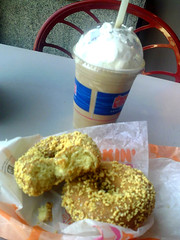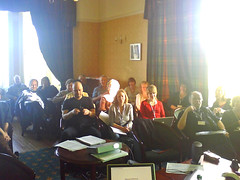Boston.
The next panel here at MiT5 is a smaller affair, and is started by Sam Smiley, presenting on Claude Shannon Remixed. She begins with a couple of video collages based on image searches on a narrow range of terms in Altavista (the video is also on YouTube). These videos use original music, but copyrighted images and videos, and Sam recently received a message through YouTube messaging from the Canadian Broadcasting Corporation asking her to take down one of the videos - but without any specific information about what aspects of the collage are owned by CBC.














